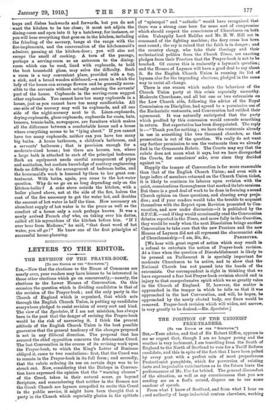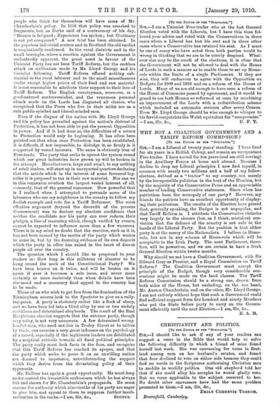THE POSITION OF THE UNIONIST FREE-TRADERS.
[To THE EDITOR ON THE "SPECTATOR'
Sin,—Your advice, and that of Sir Robert Giffen, appears to me so cogent that, though I am no longer young and the weather is very inclement, I am travelling from the South of England to the North of Scotland to vote for a Tariff Reform candidate, and this in spite of the fact that I have been pelted by every post with a perfect rain of most preposterous Protectionist pamphlets, which for perversion of existing facts and improbable vaticinations as to the future leave the performances of Mr. Ure far behind. The general discomfort of the situation, as well as my consciousness that you are sending me on a fool's errand, dispose me to use some candour of speech.
From what I know of Scotland, and from what I hear on rood authority of large industrial centres elsewhere, working people who think for themselves will have none of Mr. Chamberlain's policy. In 1906 that policy was smashed to fragments, but, as Burke said of a controversy of his day, "Reason is fatigued ; Experience has spoken ; but Obstinacy is not yet conquered." A new trial has been obtained. In the populous industrial centres and in Scotland the old verdict is emphatically confirmed. In the rural districts and in the small boroughs, where a reaction against the Government is undoubtedly apparent, the great asset in favour of the Unionist Party has not been Tariff Reform, but the reckless attack on civilisation made by Mr. Lloyd George and his Socialist following. Tariff Reform offered nothing sub- stantial to the rural labourer and to the small miscellaneous trader except higher prices of their food and raw material. It is not reasonable to attribute their support to their love of Tariff Reform. The English countryman, moreover, is a good-natured controversialist, and the venomous personal attack made on the Lords has disgusted all classes, who recognised that the Peers who live in their midst are as a rule public-spirited and liberal-minded men.
Even if the disgust of the nation with Mr. Lloyd George and his policy has prevailed against the nation's distrust of Protection, it has not been able to put the present Opposition in power. And if it had done so, the difficulties of a return to Protection would only be beginning. It has often been pointed out that when once Protection has been established, it is difficult, if not impossible, to dislodge it, so firmly is it supported by vested interests. The same is obviously true of Free-trade. The party that seeks to uproot the system round which our great industries have grown up will be broken in the attempt. Manufacturers, large and small, to say nothing of retail dealers, will start up in unexpected quarters declaring that the article which in the interest of same favoured log- roller it is proposed to tax is their raw material. Nor can we in this comiexion overlook the largest vested interest of all, —namely, that of the general consumer. How powerful that is I realised when I attempted to persuade some of the labourers who are my neighbours in the country to follow my foolish example and vote for a Tariff Reformer. The most effective argument (beyond the discredit of the present Government) was to declare my absolute confidence that neither the candidate nor his party can ever redeem their pledges, a line of reasoning which, though verified by events, cannot be expected to influence more than a few waverers. There is in my mind no doubt that the reaction, such as it is, has not been caused by the merits of the party which wishes to come in, but by the damning evidence of its own demerit which the party in office has raised in the heart of decent people all over the country.
The question which I should like to propound to your readers is : How long is this millstone of disaster to be hung round the neck of the Constitutional Party ? We have been beaten on it twice, and will be beaten on it again if ever it becomes a solo issue, and never more certainly or more decisively than when details have been discussed and a necessary final appeal to the country has to be made.
Those of us who wish to get free from the domination of the Birmingham caucus look to the Spectator to give us a rally- ing-point. A party is obviously rather like a flock of sheep, and we have been led into a blind alley by one or two unduly ambitious and determined shepherds. The result of the East Marylebone election suggests that the extreme party, though very noisy, is not very numerous. A few determined wrong- headed men, who need not live in Tooley Street or be tailors by trade, can exercise a very great influence on the psychology of a crowd, especially if the legitimate leaders are debilitated by a sceptical attitude towards all fixed political principles. The 'party really must look facts in the face, and recognise that this Tariff Reform has reached its apogee, and that the party which seeks to press it on an unwilling nation are doomed to impotence, notwithstanding the support which they derive from the devastating policy of their opponents.
Mr. Balfour has again a great opportunity. He must keep under control the irresistible enthusiasm which he has always felt and shown for Mr. Chamberlain's propaganda. He must assume the authority which nine-tenths of his party are eager to give him, and appeal to them to suppress further insub- ordination in the ranks.—I am, Sir, &c., _ Sorerus.























































 Previous page
Previous page